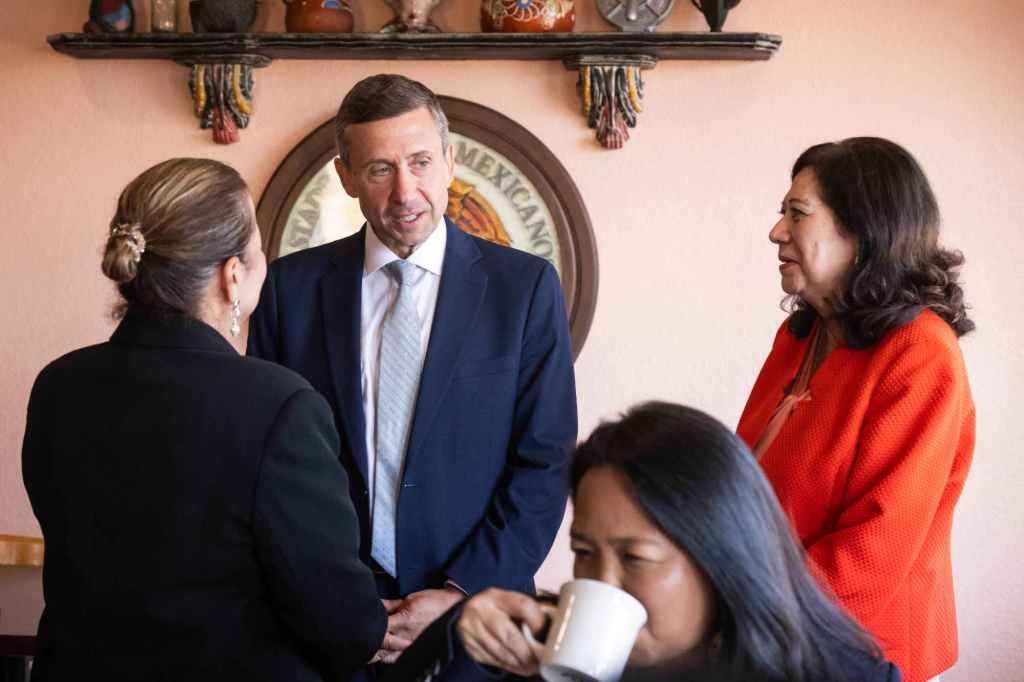Democratic National Committee Chair Ken Martin was in Los Angeles on Wednesday, July 30, where he met with more than a dozen community members who said their communities have been harmed by the widespread immigration raids and mass deportations called by the Trump administration.
The roundtable, hosted by L.A. County Supervisor Hilda Solis at an East L.A. restaurant, was an opportunity for Martin, who is traveling through California and Oregon this week, to hear directly from Angelenos about the effects of the raids on immigrant communities.
The visit was Martin’s second trip to the L.A. area this year; he previously traveled to Altadena after the Eaton fire to hear from local business leaders. He told those at the roundtable that Wednesday’s trip would not be his last, noting the prominent role that Los Angeles plays in national political conversations.
“I will keep coming here to L.A. because L.A. is really at the heart of what is happening around this country,” Martin said.
The United States, he said, is “and will always be a nation of immigrants, and we should celebrate the immigrant communities. These weren’t Democratic or Republican values. These are American values.”
Besides the immigration raids, Martin criticized President Donald Trump and his administration for supporting a federal budget that would cut Medicaid. The chair of the DNC called such actions callous.
During the roughly hourlong roundtable, Martin and Solis heard from about a dozen community members – from small business owners and health care and service providers to educators, civic leaders and immigration advocates – who described the fear running rampant among immigrants.
Many undocumented residents, the participants said, are too fearful of being arrested by immigration agents that they’re not leaving their homes. This means they’re not showing up to work, not dining out – which hurts local restaurants – skipping medical appointments, not getting their prescriptions refilled, or eating poorly if they’ve stopped going to grocery stores to pick up fresh and healthy food items, speakers said. Some rely on family members to shop or run necessary errands for them.
Participants at the roundtable also expressed frustration, saying that immigrants have contributed to the growth of the nation’s economy, yet they feel they’re being treated as criminals.
Lourdes Caracoza, president and CEO of Alma Family Services, which provides community-based services for families in East L.A., described a lack of respect by the Trump administration.
“We’re all professionals here; we’re service providers,” she said, looking around the room. “And yet this administration wants the world to see us as criminals.”
The U.S. Department of Homeland Security, in a statement it attributed to a “senior DHS official,” said that under DHS Secretary Kristi Noem, “our brave law enforcement officers are delivering on President Trump’s and the American people’s mandate to arrest and deport criminal illegal aliens to make America safe.”
“Those who are not here illegally and are not breaking other laws have nothing to fear. Elected officials choosing to fearmonger by distorting reality are doing a great disservice to our country and are responsible for the nearly 830% increase in assaults on ICE officers,” the official stated.
But speakers at Wednesday’s roundtable said some immigrants have been unjustifiably targeted and detained without cause.
The Trump administration is being sued by L.A. immigrant advocacy groups who allege that federal immigration raids are being carried out in some instances through “unconstitutional” means including detaining someone based on their race, warrantless arrests or denying detainees access to attorneys.
The case is still making its way through the court system.
Solis said in a statement after the roundtable that it was important for the chair of the Democratic National Committee to hear directly from the people impacted by Trump administration policies and the frontline workers who support them.
“As Democrats respond to Trump’s attacks on our most vulnerable, these voices must lead the conversation,” Solis said. “This was more than just a meeting; it was a meaningful dialogue with constituents and community leaders about the real-life consequences of federal actions and how we move forward together.”







